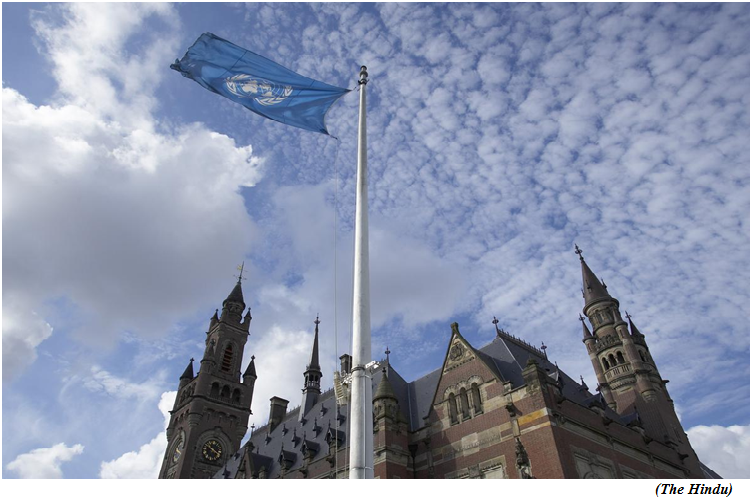International courts and climate change (GS Paper 3, Environment)

Why in news?
- A group of 16 countries has launched a gallant effort to fight the problem of climate change at the United Nations (UN).
- Led by Vanuatu, an island country in the South Pacific Ocean, the group seeks an advisory opinion from the International Court of Justice (ICJ) on the issue of climate change.
About ICJ:
- ICJ was established in 1945 by the United Nations charter and started working in April 1946.
- It is the principal judicial organ of the United Nations, situated at the Peace Palace in The Hague (Netherlands).
- Unlike the six principal organs of the United Nations, it is the only one not located in New York (USA).
Jurisdiction of ICJ:
- The ICJ has two types of jurisdictions: contentious and advisory.
- While contentious jurisdiction refers to resolving legal disputes between consenting states, under advisory jurisdiction, the UN General Assembly (UNGA), the Security Council (SC) and other specialised bodies of the organisation can request the ICJ for an opinion on a legal question.
- Unlike decisions given under the contentious jurisdiction, the ICJ’s advisory opinions are non-binding. Yet, they carry normative weight and clarify international law on a relevant issue. The ICJ’s advisory opinion on climate change will also be handy in climate-related litigation at the national level.
Vanuatu’s initiative:
- Notwithstanding the presence of several international legal instruments on climate change such as the UN Framework Convention on Climate Change, the Kyoto Protocol and the Paris Agreement, the international community has fallen short of delivering concrete solutions to the problem of climate change.
- The recently concluded 27th UN Climate Change Conference (COP-27) where countries failed to narrow their differences on critical issues such as reducing greenhouse gas emissions perfectly exemplifies the failure of the international community to get its act together on the issue of climate change.
- Small Island Developing (SID) states such as Vanuatu are most vulnerable to rising temperatures and sea levels.
- Accordingly, in September 2021, Vanuatu launched an initiative, through the UNGA, to seek an advisory opinion from the ICJ to “clarify the legal obligations of all countries to prevent and redress the adverse effects of climate change”. Since then, the initiative has gathered momentum with more than 100 countries backing the idea.
Legal questions in draft:
- Specifically, the draft resolution piloted by Vanuatu seeks answers to the following questions from the ICJ.
Law obligations:
- First, what are the international law obligations of countries toward the protection of the climate system from anthropogenic emissions of greenhouse gases for the present and future generations?
- In answering this question, expectedly, the ICJ will not only interpret and clarify the existing international climate change law enshrined in various international environmental treaties but, as several scholars argue, also use the general and customary international law (CIL) to fill the gaps in these treaties.
- Thus, the ICJ can use the ‘no-harm’ principle (states are under an obligation that activities within their jurisdiction do not damage other countries) to shed light on equivocal provisions of the Paris Agreement.
Legal consequences:
- Second, given these international legal obligations, what are the legal consequences for states that have caused significant harm to the climate system, the SID states and other people of the present and future generations?
- This question seeks to determine the price that states should pay for not honouring their international legal obligations on climate change.
- As part of climate justice, there is a long-standing demand for climate reparations, that is, the rich countries that have historically caused maximum greenhouse gas emissions should compensate developing countries bearing a disproportionate brunt of climate change.
- At COP-27, while it was agreed to establish a “loss and damage” fund to financially assist vulnerable developing countries, there is little clarity on which countries will provide the funding. In this regard, the ICJ’s answer to the second question can predictably elaborate on the legal principles that might help the operationalisation of the ‘loss and damage’ fund.
Advisory opinion of ITLOS:
- It is not just the ICJ whose advisory opinion is being sought. The Commission of Small Island Stateson Climate Change and International Law, comprising countries like Antigua and Barbuda and Tuvalu, has sought the advisory opinion of the Hamburg-based International Tribunal for the Law of the Sea (ITLOS).
- ITLOS has been requested to determine the specific obligations of the countries under the United Nations Convention on the Law of the Sea about preventing, controlling, and reducing pollution of the marine environment.
- The challenges of ocean warming, sea level rise and ocean acidification are all linked to the marine environment.
Conclusion & Way Forward:
- These advisory opinions are not a panacea. They may even turn out to be double-edged swords depending on the kind of verdict delivered. Nonetheless, as part of a multi-pronged approach to saving our planet, one should welcome the role of international courts.
- Developed countries and groupings like the G-20 should support these laudable initiatives of the SID states. Environment and climate sustainability are important themes of G-20.
- India, as the president of the G-20, should take a lead given its relentless emphasis on LiFE (developing environment-friendly lifestyle) campaign.


